Finding the right curtain length can change your space from dull to stunning. This guide will make picking window treatment lengths easy. Did you know curtains can be as short as 63 inches or as long as 108 inches? We’ll show you how to pick the perfect length for your space.
Knowing about curtain sizes is key to a great look. Whether you want a modern or traditional feel, the right curtain length matters. We’ll explore how to measure, choose, and style your curtains for the best effect.
Want to improve your home decor? This guide will make you an expert at choosing the right curtain lengths. We cover everything from short sill-length curtains to long, floor-sweeping ones. Let’s start your journey to perfect window treatments!
Key Takeaways
- Standard curtain lengths range from 63 to 108 inches
- Proper measurement is crucial for achieving the desired look
- Consider window size, rod placement, and style when selecting curtain length
- Custom curtains offer solutions for non-standard windows
- The right curtain length can significantly impact room aesthetics and functionality
Understanding the Importance of Curtain Lengths
Curtain lengths are key to both the look and feel of a room. They can change how a space looks and work better. Let’s explore why curtain lengths are important and their effect on your home.
Impact on Room Aesthetics
Curtains greatly affect how a room looks. Floor-length curtains, just 1/2 inch above the floor, give a relaxed feel. For a grand look, curtains can hang 10 to 12 inches below the floor. This style is perfect for formal areas, adding beauty and class.
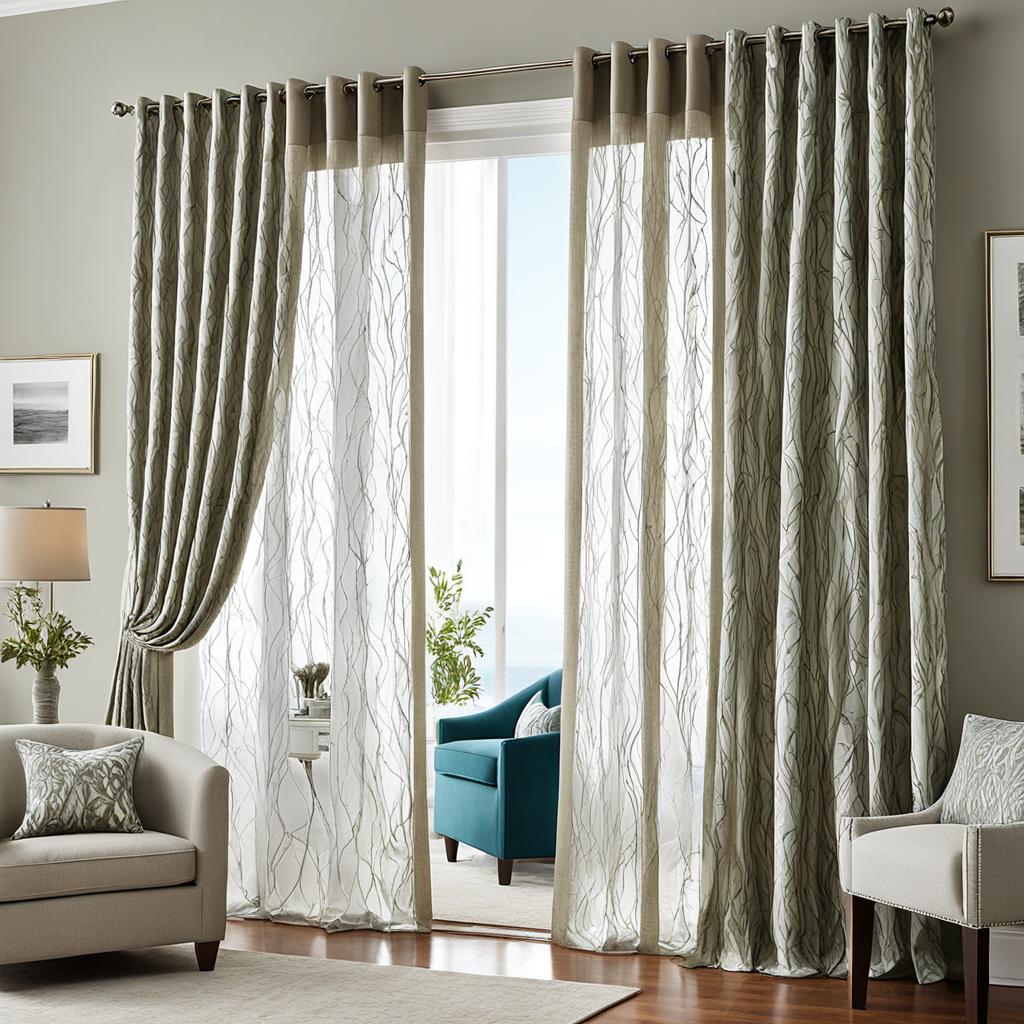
Functional Considerations
Think about how you’ll use the curtains when picking their length. Sill-length curtains are great for kitchens or areas where floor-length ones won’t work. For a sleek look, choose curtains that barely touch the floor. It’s important to measure right – curtains that are too short look bad, and ones that are too long collect dust.
Creating Visual Illusions with Curtain Lengths
Curtains can make windows look bigger. Use curtain rods close to the ceiling for this effect, especially in rooms with low ceilings. Adding rods beyond the window frame by four inches or more makes curtains look fuller. Choosing the right window treatment size can make a room seem bigger, so pick carefully to improve your space.
| Ceiling Height | Recommended Curtain Length |
|---|---|
| 8 feet | 84 inches |
| 9 feet | 96 inches |
| 10 feet | 108 inches |
| 12 feet | 120 inches |
Standard Curtain Lengths and Their Applications
Knowing the standard curtain lengths is essential for the perfect window look. Curtain dimensions are key for both looks and function. Let’s look at the most common lengths and where they fit best.

Each length has its own use and fits different windows. For instance, 63-inch curtains are great for short windows. On the other hand, 108-inch panels are perfect for windows that go all the way to the ceiling. It’s smart to choose the next standard length, picking longer over shorter ones.
| Room | Common Curtain Length | Best Application |
|---|---|---|
| Living Room | 84-108 inches | Floor-length for elegance |
| Bedroom | 63-95 inches | Varied lengths for privacy |
| Kitchen | 24-36 inches | Café curtains for light |
| Bathroom | 45-54 inches | Short for practicality |
Remember, the width of your curtains should be two to three times the rod length for a full look. For an 18-foot rod, go for four 54-inch wide panels for the best effect.
“The right curtain length can transform a room, creating the illusion of height and adding a touch of elegance.”
Understanding these curtain lengths and their uses helps you pick the best drapery for your space. This way, you’ll boost both style and function.
Measuring for Curtain Length: A Step-by-Step Guide
Getting the right curtain length is key for a great look. This guide will help you get perfect measurements for your windows.
Tools You’ll Need
Before you start measuring, make sure you have these items:
- Tape measure
- Level
- Pencil
- Stepladder
Measuring Process
Here’s how to measure for curtains:
- Measure from the curtain rod to where you want the curtains to end (the floor, sill, or below the sill).
- For floor-length curtains, add 0.5 inches above the floor.
- Think about the type of curtains you’re using (rod-pocket, tab-top, grommet) when measuring.
Common Measuring Mistakes to Avoid
Avoid these mistakes when measuring for curtains:
- Don’t forget to consider the rod placement.
- Remember to include a hem allowance.
- Don’t overlook the fullness factor (curtains should be 2-2.5 times the window width).
| Curtain Style | Recommended Width | Length Adjustment |
|---|---|---|
| Grommet | 2x rod width | Add 1.5 inches for ‘upstand’ |
| Tab Top | 2x rod width | Measure from top of rod |
| Rod Pocket | 2-3x rod width | Measure from top of rod |
| Flat Panel | 1.5-3x rod width | Consider 4-inch header tape |
If you’re unsure, it’s best to choose longer curtains. They can be shortened if needed. With these tips, you’ll become a pro at measuring curtains in no time.
Curtain Length Guide: Choosing the Right Style for Your Space
Finding the right curtain length is key to perfect window treatment. This guide will walk you through the options and help you pick what’s best for your room.
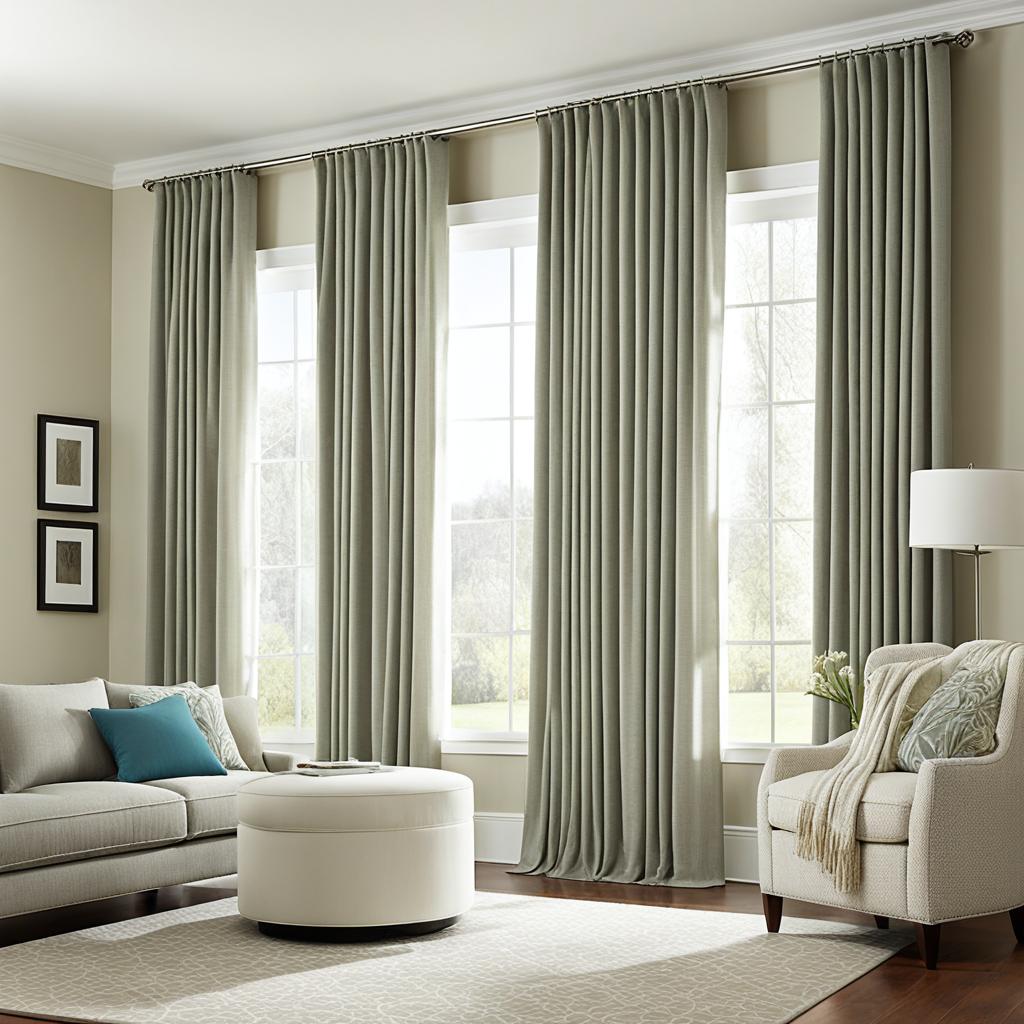
- Sill-length curtains
- Apron-length curtains
- Floor-length curtains
- Puddle-length curtains
Each type has its own purpose and look. Let’s dive into these options:
| Curtain Style | Length | Ideal Drop | Best For |
|---|---|---|---|
| Sill-length | 63 inches | Just above window sill | Kitchens, casual spaces |
| Apron-length | 84 inches | 4 inches below sill | Living rooms, bedrooms |
| Floor-length | 84-96 inches | 1/4 inch above floor | Formal areas, living rooms |
| Puddle-length | 108 inches | 5-8 inches on floor | Grand, luxurious spaces |
These guidelines are just a starting point. Your choice should match your room’s style and your needs. For a sleek look, hang curtains above and wider than your window. This makes windows look bigger and ceilings higher.
“The right curtain length can transform a room from ordinary to extraordinary. It’s all about finding the perfect balance between style and function.”
If you’re unsure, go for longer curtains. They can always be shortened. With these tips, you’ll easily find the perfect curtains for your space.
Floor-Length Curtains: Elegance and Versatility
Floor-length curtains add elegance to any room. They come in various styles, each perfect for different spaces.
Types of Floor-Length Curtains
Floor-length curtains are usually categorized into three types:
- Kissing the floor: These curtains just touch the ground, giving a clean look.
- Hovering: Ending a bit above the floor, these curtains look modern.
- Curtain pooling: This style has extra fabric on the floor, adding luxury and romance.
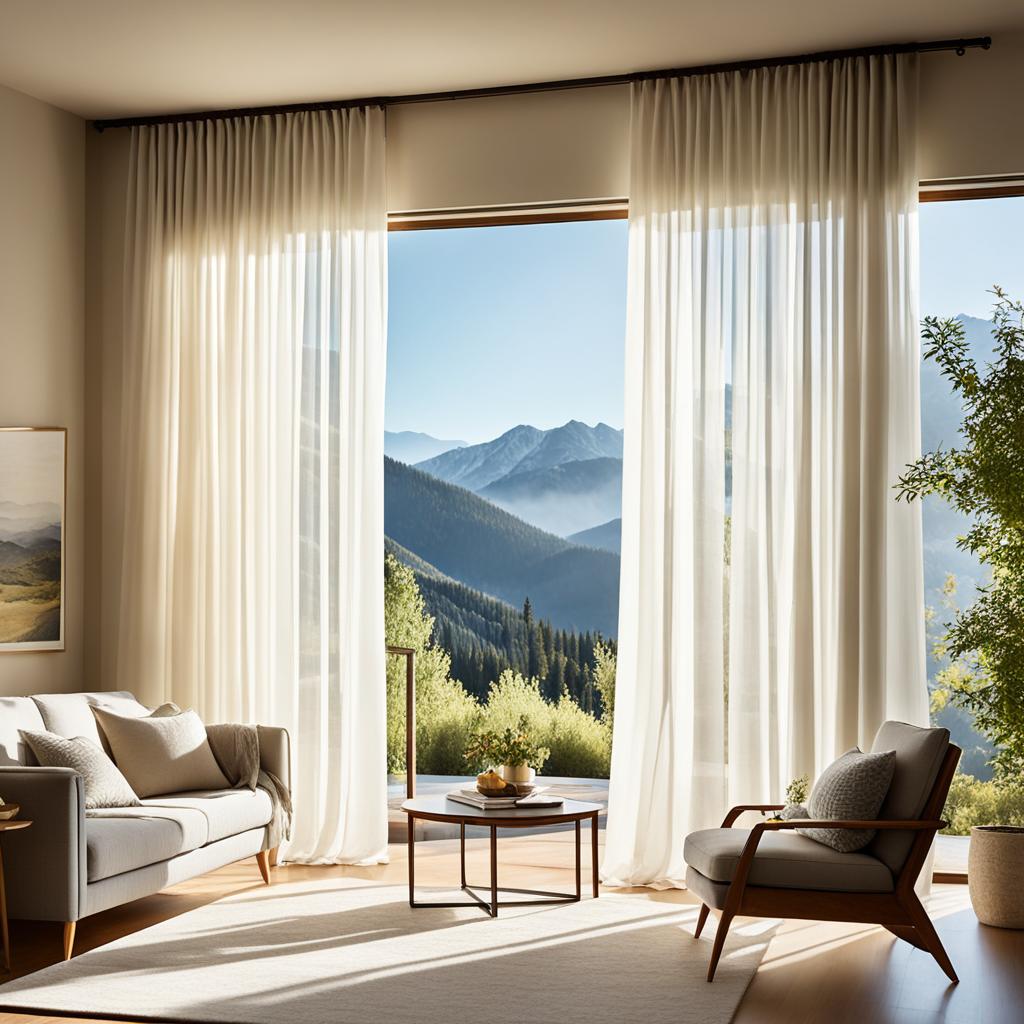
Best Rooms for Floor-Length Curtains
Floor-length curtains work well in many rooms. They’re great for:
- Living rooms: They make the space look polished and welcoming.
- Bedrooms: They add warmth and privacy.
- Dining areas: They enhance the elegance during meals.
Styling Tips for Floor-Length Curtains
Here are some tips to style your curtains elegantly:
- Choose curtains 2-2.5 times your window’s width for a full look.
- Layer with sheer curtains for depth.
- Try tiebacks for different looks during the day.
- Go for curtain pooling in formal areas for drama.
| Curtain Length | Style | Best For |
|---|---|---|
| 84 inches | Kissing the floor | Standard windows |
| 96 inches | Hovering | Taller windows |
| 108 inches | Curtain puddle | High ceilings |
Remember, floor-length curtains can make ceilings seem higher and rooms look bigger. By following these tips, you’ll make a big impact in your home.
Sill and Apron Length Curtains: Practical and Charming

Sill length curtains are great for kitchens and bathrooms. They are 45 to 54 inches long, reaching the windowsill. This length lets in light while keeping things private.
Apron length curtains are a bit longer, hanging 4 to 6 inches below the sill. They measure 63 to 65 inches. These curtains add elegance without taking up too much space. A Houzz survey showed 26% of homeowners like them for kitchens.
Both types are perfect for rooms with radiators or furniture under windows. They make cleaning easy and keep fabric away from damp spots in bathrooms or kitchens.
| Curtain Type | Typical Length | Best Uses |
|---|---|---|
| Sill Length | 45-54 inches | Kitchens, bathrooms, casual spaces |
| Apron Length | 63-65 inches | Living rooms, bedrooms, dining areas |
For a modern look in kitchens, try café curtains. These half-window coverings hang at the midpoint, giving privacy and letting in light.
Choose lightweight fabrics like cotton or linen for these curtains. They flow well and are simple to keep clean, ideal for busy areas like kitchens and bathrooms.
“Sill and apron length curtains bring a balance of style and functionality to any room. They’re the unsung heroes of window treatments, offering privacy without sacrificing natural light or ease of use.”
Safety is key. Don’t hang curtains near stoves to avoid fire risks. With the right length and fabric, sill and apron length curtains can change your space. They add both charm and practicality.
Customizing Curtain Lengths for Unique Windows
Unique windows need custom curtain lengths and creative window treatments. Whether you have bay windows, arched windows, or tall windows, the right solutions make a big difference. They ensure a perfect fit and boost the look of your space.
Dealing with Bay Windows
Bay window curtains need extra care. Use separate rods for each part of the window. This method improves light control and makes your curtains look more tailored. Floor-length curtains add elegance and match the window’s design.
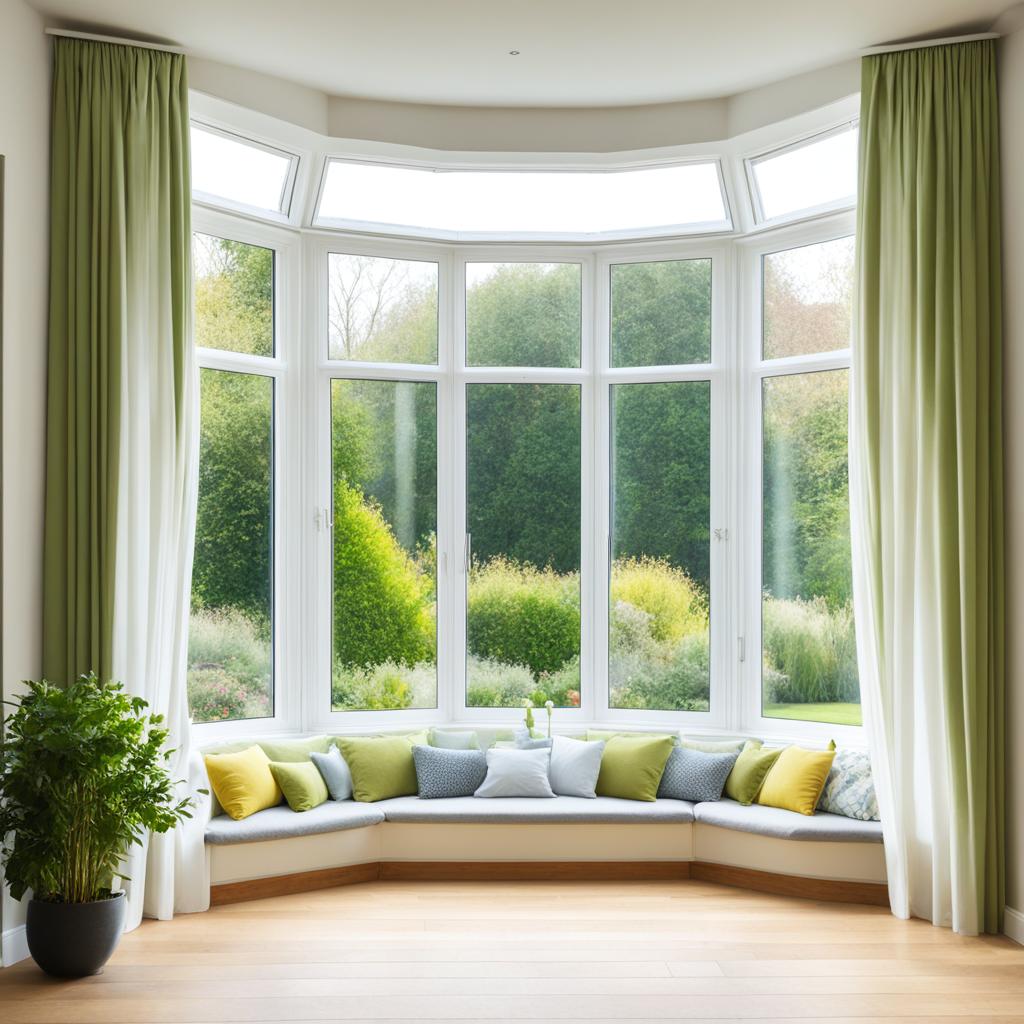
Addressing Arched Windows
Arched windows are a bit tricky. Place the curtain rod above the arch to keep things looking unified. This trick makes the window seem taller and more striking. Choose curtains that hit the floor for a grand look.
Solutions for Extra Tall Windows
For tall windows, go for floor-length curtains to highlight the height. Here are some ideas:
- Hover curtains: Hang just above the floor for a clean look
- Kiss curtains: Barely touch the floor for a tailored appearance
- Puddle curtains: Gather on the floor for a luxurious feel
Custom curtain lengths are key for non-standard windows. They ensure a perfect fit and style. With the right treatments, even tough windows can become beautiful highlights.
| Window Type | Recommended Treatment | Rod Placement |
|---|---|---|
| Bay Windows | Separate rods for each section | Individual mounts for each window |
| Arched Windows | Single rod above the arch | 6-8″ above the arch peak |
| Extra Tall Windows | Floor-length curtains | 4-6″ above window frame |
Curtain Rod Placement and Its Effect on Length
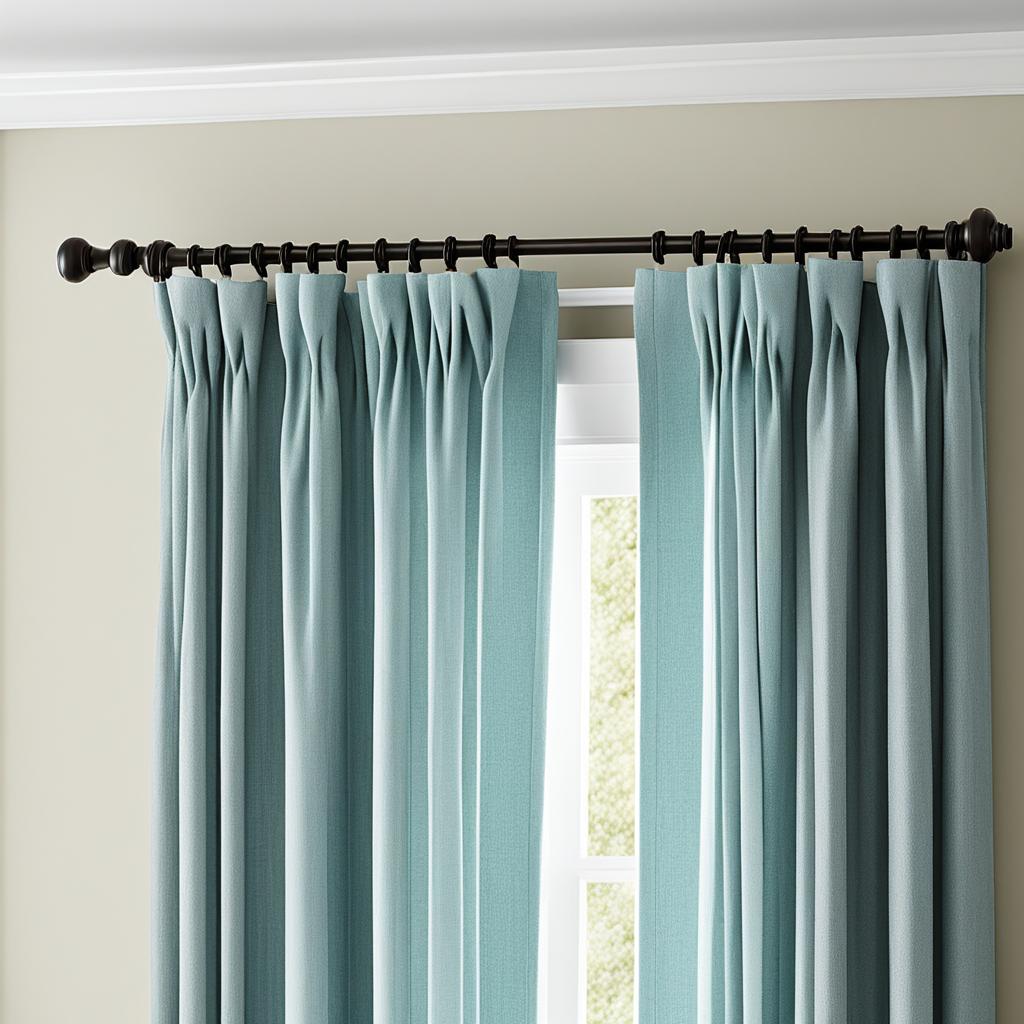
Choosing the right spot for your curtain rod is key. It can make windows look bigger and ceilings seem higher. For a sleek look, place your rods 4 to 6 inches above the window frame. This trick makes windows appear taller and your room feel more spacious.
When hanging curtains, make sure the rod extends 3 to 6 inches beyond the window on each side. This lets more light in when the curtains are open and makes windows seem wider. For bigger windows, you might want to extend the rod up to 10 inches for a bigger impact.
The type of curtain hardware you pick also matters. Choose rods and finials that match your curtains and room style. Big, heavy curtains go well with large, decorative rods, while light curtains look better with smaller ones.
“Properly hung drapes can create an illusion of larger windows and taller ceilings.”
For a full, luxurious look, pick curtain panels that are two to two-and-a-half times the width of your window. This ensures a beautiful, gathered effect when the curtains are closed. The right spot for your curtain rod and panel size can really change how your room looks.
- Mount rods 4-6 inches above window frame
- Extend rods 3-6 inches beyond frame on each side
- Choose hardware that complements fabric and decor
- Select panels 2-2.5 times window width for fullness
Fabric Considerations for Different Curtain Lengths
Choosing the right curtain fabric is key for the perfect look and function in your home. A guide to curtain materials can help you pick from many options. Let’s see how different fabrics affect curtain lengths and styles.
Light vs. Heavy Fabrics
Light fabrics like cotton and linen are great for shorter curtains. They give a breezy, casual vibe, perfect for sill or apron-length curtains. On the other hand, heavy fabrics such as velvet or brocade are best with floor-length or puddle-length curtains. They add luxury to your space.

Draping Characteristics of Various Materials
Materials drape differently, changing how your curtains look. Silk and rayon flow beautifully, making them good for longer curtains. Polyester and acrylic are versatile and work well with various curtain lengths. When picking drapery fabric, think about the fullness ratio. It’s usually 2:1 for a standard look, but you can adjust it.
Seasonal Fabric Choices
Seasonal window treatments can make your home more comfortable all year. For summer, go for light, airy fabrics in shorter lengths for better airflow. In winter, choose heavier, insulating materials in longer lengths to stay warm. This way, your curtains are both useful and stylish all year.
| Season | Fabric Type | Recommended Length |
|---|---|---|
| Summer | Cotton, Linen | Sill or Apron |
| Winter | Velvet, Heavy Cotton | Floor or Puddle |
Conclusion
Choosing the right curtain length is crucial for a great look in your space. This guide has shown how ceiling height and room use affect the perfect fit. For 8-foot ceilings, go for 90 to 95-inch curtains. For 12-foot ceilings, use 144-inch curtains for a big impact.
Think about the width of your curtains too. Aim for panels 1.5 to 2 times the window width for a full look. Overlap panels by 6 inches for a unified effect on separate windows. Make sure curtains just touch the floor to avoid bunching.
Getting the perfect fit means measuring carefully and thinking about your space. Use a steel measuring tape for accuracy. Consider the rod placement too. Whether it’s a formal living room or a cozy bedroom, the right length can make a big difference in how your room looks and feels.
